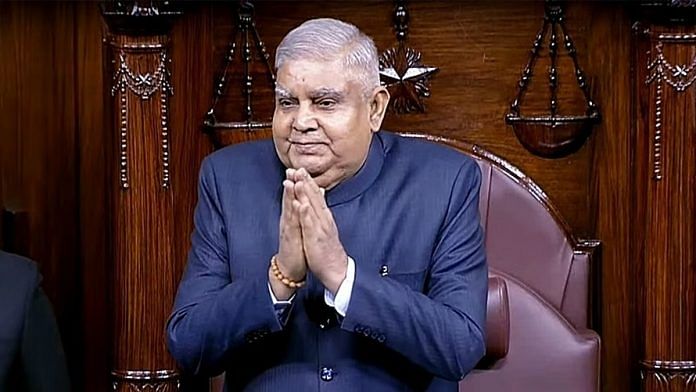New Delhi: Continuing his tirade over the judiciary’s alleged overreach, Vice President Jagdeep Dhankhar Wednesday said that in a democratic society, “the basis” of any “basic structure” has to be the supremacy of the mandate of people and the primacy and sovereignty of Parliament, and that legislature is “inviolable”.
Dhankhar, who is the Rajya Sabha chairperson, was addressing the valedictory ceremony at the 83rd All India Presiding Officers’ Conference in Jaipur. He said that the most recent and prominent judicial manifestation of the “basic structure doctrine” was on 16 October 2015, when the Supreme Court, in a 4-1 majority verdict, held both the 99th Constitution Amendment Act, 2014, and the National Judicial Appointments Commission (NJAC) Act, 2014, “unconstitutional on the premise of being in violation of the basic structure”.
Speaking about how “history of sorts” was created in Parliament when both the Lok Sabha and Rajya Sabha voted in favour of this constitutional amendment and 16 state legislatures ratified it, Dhankhar said it was “undone” by the judiciary.
“Such a scenario is perhaps unparalleled in the democratic history of the world,” he said, adding that the executive is also ordained to be in compliance with the constitutional prescription emanating from the Parliament. “It was obligated to adhere to the NJAC. Judicial verdict cannot run it down,” the Vice-President said.
‘Parliament obligated to protect sovereignty of people’
“Parliamentary sovereignty and autonomy cannot be permitted to be qualified or compromised as it is quintessential to survival of democracy. No institutions can wield power or authority to neutralise the mandate of the people. It is the obligation of Parliament and legislatures to protect the sovereignty of the people,” Dhankhar said.
The Vice President said that on this count, the current scenario calls for the serious attention of all concerned, particularly those at the helm of these institutions. “All constitutional institutions, the judiciary, the executive and the legislature are required to confine to their respective domains and conform to the highest standard of propriety and decorum.”
Dhankhar said that in 1973, in the Kesavananda Bharati case, the Supreme Court evolved for the first time the right of the courts to strike down constitutional amendments that violated what it called the “basic structure” or the fundamental architecture of the Constitution.
“In subsequent years, the highest court delivered significant rulings on matters that it held pivotal to this ‘basic structure’ and in the process parliamentary sovereignty was compromised,” he said.
The Vice President said that the Constitution never envisaged a “third and superior chamber for Parliament to grant approval to the legislation passed by the two Houses”.
He added that all such aspects need to be deliberated as “Parliament and legislatures are eminently suited to effect congeniality between the legislature, the executive and the judiciary. This needs to be the priority concern given the frequent public stance by these institutions that generate a worrisome ecosystem.”
Dhankhar also highlighted the disruptions that have come to mar the recent Parliament sessions and called them a “cause of concern”.
“Be in no doubt, the anguish and disappointment of the people at lack of decorum and discipline in proceedings in Parliament and legislatures is severe. There is continual diminishing of respect in public for Parliament and legislatures and their representatives. There could not be more urgency for being in correctional mode,” he said.
(Edited by Smriti Sinha)
Also read: How Modi govt bill aims to get rid of 113 ways you could land in jail & put onus on fines instead



